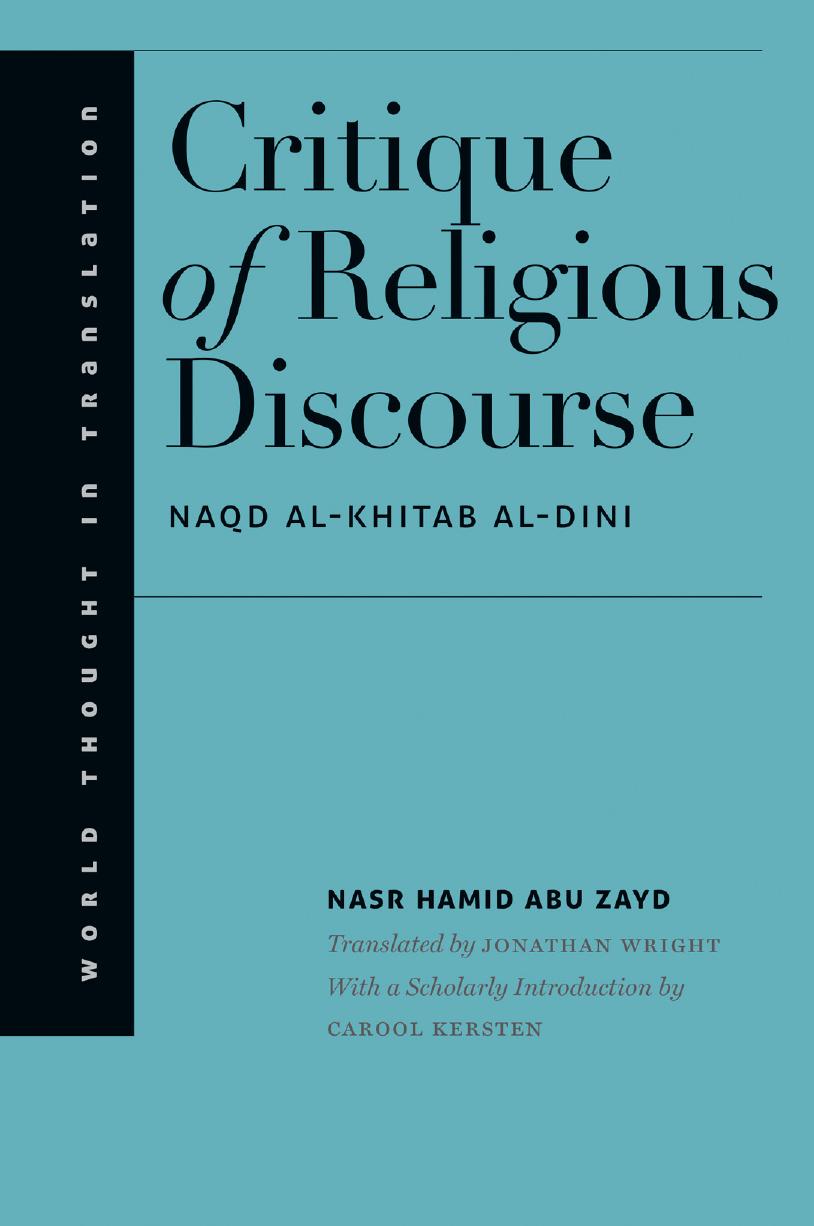Critique of Religious Discourse by Nasr Hamid Abu Zayd

Author:Nasr Hamid Abu Zayd [Zayd, Nasr Hamid Abu]
Language: eng
Format: epub, pdf
Publisher: Yale University Press
The Past and the Present: The Root and the Branch
It is obvious that in any dialectical relationship one of the parties to the relationship has theoretical priority and takes precedence over the other—a priority that allows for analysis, observation, and measurement, because analysis must depend on holding one party still in order to measure the relative movement of the other party. Without this process of immobilization, understanding is an impossible demand. It would be easy to say that a dialectical relationship means constant interaction and continual dynamism, which makes it impossible to talk about one party being immobilized, other than as a hypothesis or as an imaginary concept. Nevertheless, hypotheses and imaginary concepts are the basis of inquiry and prerequisites for the process of understanding. So a primary element or party must be identified in the dialectic between the past and the present, on the basis of which the thinker or the inquirer can formulate his initial conceptual position, without ignoring, of course, the rules of the dialectic. But religious thinking, especially of the rightist kind, ignores this dialectical relationship and gives the past existential and cognitive priority so that it becomes the invariable essence, and the present’s relationship with the past becomes a relationship of dependence and subservience, very similar to an accidental property’s relationship with what is essential or substantial. In some traditional formulations, relationships between accidental properties and essences may be interactive relationships in that each needs the other in order to be visible and to acquire an identity, but the concept that religious thought has of the relationship between the past and the present goes nowhere near that. The past is the basis, and the present has to conform to it. If the present diverges too much from the past in appearance, it becomes corrupted and loses its way. Therefore the salafist religious discourse seeks to reshape the present to make it look like the past, and because this is an impossible dream, the discourse is dominated by histrionic, sanctimonious rhetoric and relies on mental strategies of a demagogic nature. Salafist thinkers turn into something like Old Testament prophets, heaping curses on people and society and threatening them with calamities and destruction.
But the Islamic left is armed with a deeper awareness and more refined intellectual and rhetorical tools. It offers a more profound concept of the relationship between the past and the present, a concept that does not rise to the level of the dialectic but that is more fertile and more vibrant. It is a concept that goes along with the syncretism that is the strategy of the leftist discourse. It is that the past, as defined in tradition, is implicated in shaping the present, not directly but after turning into a psychological reserve for the masses. This “stockpiled” tradition represents, in the eyes of the Islamic left, the theoretical basis for structuring the real world (see 1/5, 323). In many of the values and ideas that are common in our culture and our behavior
Download
Critique of Religious Discourse by Nasr Hamid Abu Zayd.pdf
This site does not store any files on its server. We only index and link to content provided by other sites. Please contact the content providers to delete copyright contents if any and email us, we'll remove relevant links or contents immediately.
The Lost Art of Listening by Michael P. Nichols(7506)
Why I Am Not A Calvinist by Dr. Peter S. Ruckman(4153)
The Rosicrucians by Christopher McIntosh(3520)
Wicca: a guide for the solitary practitioner by Scott Cunningham(3178)
Signature in the Cell: DNA and the Evidence for Intelligent Design by Stephen C. Meyer(3138)
Real Sex by Lauren F. Winner(3023)
The Holy Spirit by Billy Graham(2952)
To Light a Sacred Flame by Silver RavenWolf(2823)
The End of Faith by Sam Harris(2742)
The Gnostic Gospels by Pagels Elaine(2531)
Waking Up by Sam Harris(2460)
Nine Parts of Desire by Geraldine Brooks(2369)
Jesus by Paul Johnson(2362)
Devil, The by Almond Philip C(2331)
The God delusion by Richard Dawkins(2309)
Heavens on Earth by Michael Shermer(2284)
Kundalini by Gopi Krishna(2185)
Chosen by God by R. C. Sproul(2164)
The Nature of Consciousness by Rupert Spira(2108)
